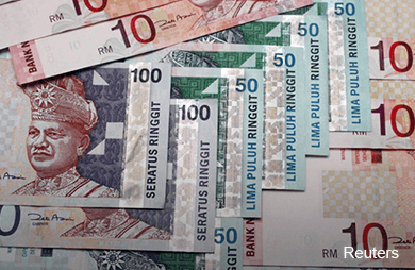
KUALA LUMPUR (Nov 11): The ringgit depreciated to its weakest level at 4.3700 against a strengthening US dollar in anticipation that the US will raise interest rates in the near term. This is on expectation that US President-Elect Donald Trump's expansionary fiscal policy would lead to inflation.
The US dollar-ringgit exchange rate so far today was between 4.2952 and 4.3700, Bloomberg data showed. The US Dollar Index, which measures the value of the US dolllar against a basket of currencies, rose to between 98.802 and 98.914.
Other Asian currencies also weakened against the US dollar. At the time of writing, the Singapore dollar depreciated to 1.4139 while the Thai baht's exchange rate was at 35.34.
Credit Suisse analysts wrote in a note : "Our US teams have earlier argued that a Trump presidency would result in expansionary fiscal policy, implying greater inflation and supply pressure for US yields to prove higher than otherwise.
"However, it will be at least a quarter or two for this expected fiscal stimulus to happen. This leads us to break our thinking about the macro outlook for Asia into phases. The first phase, the next few months, is likely to be a period of increased market and business uncertainty about policy that may weaken investment and growth in the region."
Credit Suisse said Trump's policies were not expected to bode well for for Asian currencies over time.
This is on expectation of the US' higher interest rates and international trade policies under his administration.
"We are not making any changes to our Asian FX forecast set in this report. However, we think that new President Trump’s espoused policy framework should be bearish for Asian currencies over time. Asian growth will likely suffer if US policy turns more hostile to trade while the higher US interest rate structure that we expect to eventuate from more expansionary US fiscal policy risks shifting relative yields against Asia.
"However, we stress that it is important to think about this in phases.
The MYR would likely suffer if President Trump liberalises the regulatory environment for US oil and gas, increasing production and depressing global oil prices," Credit Suisse said.